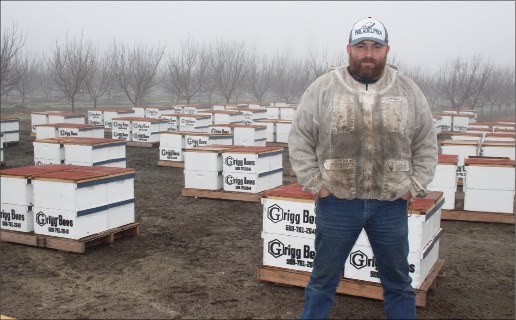On the Mariposa County Board of Supervisors Meeting Agenda for Tuesday, January 22, 2019 the Consent Agenda has the following:
Mariposa County Agricultural Commissioner;
Approve the County Bee Safe Program Cooperative Agreement Number 18- 0564-000-SG for Fiscal Year 2018/2019 with the California Department of Food and Agriculture (CDFA), and Authorize the Board of Supervisors Chair to Sign the Agreement
January 20, 2019 - To safeguard honeybees and improve communication, commercial beekeepers who place colonies into crops for pollination must comply with a program that requires  them to register beehive locations and notify county agricultural commissioners whenever the hives are moved.
them to register beehive locations and notify county agricultural commissioners whenever the hives are moved.
(Left) Beekeeper James Barnett brought honeybees from the state of Washington to San Joaquin County for the upcoming almond bloom. He would be among the beekeepers covered by a state beehive-registration program intended to improve honeybee health. Photo/Christine Souza
The state bee-registration program, known as "BeeWhere," has been updated to include enforcement under Assembly Bill 2468. The program intends to prevent colony weakness due to pesticide exposure, pest and disease pressures and inadequate forage, and to prevent theft. New technology to operate the program has been developed by the California Agricultural Commissioners and Sealers Association, California Association of Pest Control Advisors, California State Beekeepers Association and the Almond Board of California.
The participating groups said registering hives in the state—modeled after an existing hive registration program called FieldWatch that operates in 20 other states—increases communication among beekeepers, pest control advisors and county agricultural commissioners to protect bee health.
"Beekeepers need to feed and water bees and take care of varroa mites, but what we in agriculture can act upon is when and how pesticides are applied around bees," CAPCA Chief Executive Officer Ruthann Anderson said. "Being able to communicate that information was vital to agriculture being able to say we are doing our due diligence to safeguard bee health. It all hinged on having beekeepers register, for everything else to fall into place."
Under BeeWhere, beekeepers must register the owner name, number of hives and location, and hives must be marked with identifying information. For registration and notification, beekeepers are encouraged to use an online system through the BeeWhere or FieldWatch websites.
Beekeeper Jackie Park-Burris of Palo Cedro, who chairs the California State Beekeepers Association legislative committee, reminded beekeepers that the requirement to register beehives "has been on the books for years in California," adding, "We are trying to change people's behavior."
Park-Burris said she understands concerns beekeepers have related to the registration program, but said the system will help protect bees—something beekeepers have been advocating for many years.
"If bees are registered and an adjacent crop needs to be sprayed, applicators will write a different directory if they know that bees are in the area," Park-Burris said. "They want to know where the bees are."
Beekeeper James Barnett, who arrived in California from the state of Washington with a load of beehives in preparation for almond bloom, expressed concern regarding the updated hive registration program.
"In theory, it sounds good, but it is really tough to protect the bees because they will fly up to 8 miles," Barnett said.
Sandy Elles, CACASA executive director, said during this pilot year, beekeepers can register or report movement of bees from a tablet or personal computer, but eventually, "you should be able to pin your hives by smartphone."
The program also uses GIS mapping through CalAg Permits, which is how commissioners communicate with the Department of Pesticide Regulation, which will aid commissioners in tracking hive locations and be linked to crop management software such Agrian and CDMS, according to San Joaquin County Agricultural Commissioner Tim Pelican.
"If the PCA writes a recommendation with a bee label on it, it can be communicated to the beekeeper, 'Hey, there's going to be an application taking place within 48 hours of one mile of your location,'" Pelican said.
Under BeeWhere, he said, commissioners now have authority to seek administrative civil penalties when a beekeeper does not register or does not provide notification of hive movement. Beekeepers that do not comply can face penalties ranging from $50 to $1,000, beginning in 2020.
As part of the larger effort to protect bees in California, Pelican said funding will go to counties through the California Department of Food and Agriculture Bee Safe program—meant to ensure safe movement of colonies, prevent theft and promote best management practices. This funding will purchase seed for forage crops and for mapping safe-harbor locations for bees, should beekeepers need a temporary place for them during an application.
Park-Burris said she typically registers her apiaries in early January in Shasta County, then transports them to almond orchards, where she registers the hives in that county. She said BeeWhere will bring "an extra layer for me: notification of when I'm leaving the almond county and when I'm returning to my home county."
For those with large numbers of apiaries, such as bee brokers who must register several thousand hives, Park-Burris said, the California State Beekeepers Association and Almond Board have invested in FieldWatch to make registration easier.
To learn more about BeeWhere, see beewherecalifornia.com.
(Christine Souza is an assistant editor of Ag Alert. She may be contacted at csouza@cfbf.com.)
Reprinted with permission: California Farm Bureau Federation








